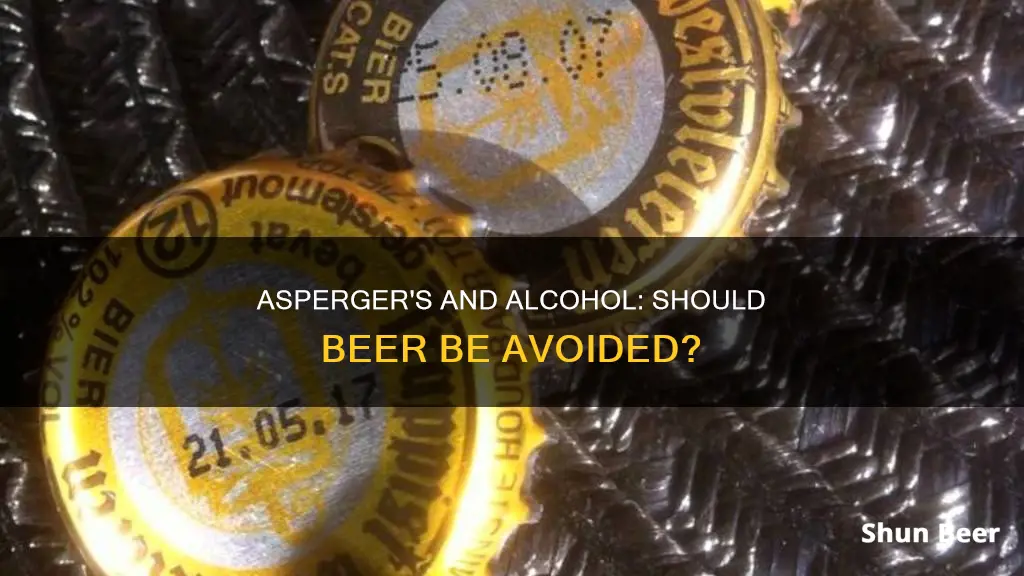
Drinking alcohol is a popular pastime worldwide, but how does it affect people with Asperger's? Asperger's syndrome is a neurobiological disorder characterised by difficulties in social interaction and nonverbal communication, along with repetitive patterns of behaviour and interests. Many people with Asperger's also have above-average intelligence. While there is no cure, some may find that drinking beer helps to relax them and reduces social anxiety. However, drinking also comes with risks, and people with Asperger's need to be aware of these. This is because they are more likely to develop unhealthy dependencies and may use alcohol as a crutch to cope with their anxiety.
What You'll Learn

Beer as a relaxant for people with Asperger's
People with Asperger's syndrome often experience significant difficulties in social interaction and nonverbal communication, along with restricted and repetitive patterns of behaviour and interests. Many people with Asperger's also have above-average intelligence. While there is no cure, treatments can help people manage the condition.
Some people with Asperger's may find that drinking beer helps to relax the body and mind and reduce social anxiety. However, it is important to be aware of the risks. Drinking too much beer can lead to intoxication, which can worsen symptoms. Beer also contains calories, and obesity is a risk for some people with Asperger's.
Alcohol as a Coping Mechanism
People with Asperger's are twice as likely to form addictions, and alcohol can be a very tempting sedative for traits that some people with the syndrome see as holding them back. Alcohol blocks neurons responsible for stress and anxiety and, in larger quantities, releases dopamine, which makes people feel good.
The Drawbacks
For people with Asperger's, alcohol can mean a complete loss of self-control, with thoughts slowed down and hazy memories. Most drinking environments will involve loud noises, cramped spaces, and other things that can distress the senses of people with Asperger's.
The Risk of Addiction
People with Asperger's are less likely to drink socially or binge drink. However, if they do drink, they are more likely to repeat the behaviour and are at increased risk of becoming alcoholics. This may be because drinking is more common in those with high IQs, or it may be a way to overcome the severe mental health challenges that often accompany Asperger's.
A Need for Better Research and Support
Research on the topic of Asperger's and alcohol has often been contradictory and lacking. This presents missed opportunities within autism academia. Many adults are undiagnosed, and alcohol can act as a successful coping strategy, hiding autistic difficulties for many years.
When it comes to supporting people with Asperger's who have drinking problems, any help offered must come from someone who understands the complexities of the condition. Many mainstream therapies involve group talks and peer interaction, which can overload social anxiety and be detrimental.
A Final Note
Overall, drinking beer can be helpful for some people with Asperger's, but it is important to drink in moderation and be aware of the potential risks.
Exploring the Authentic Mexican Beer Drinking Experience
You may want to see also

The risks of drinking beer for people with Asperger's
People with Asperger's syndrome may consider drinking beer to help them relax and reduce social anxiety. However, it is important to be aware of the risks associated with alcohol consumption. Here are some of the dangers that people with Asperger's may face when drinking beer:
Loss of Self-Control
Alcohol can lead to a complete loss of self-control for people with Asperger's, resulting in slowed thoughts, hazy memories, and difficulty avoiding unwanted social interactions. This loss of self-control can be particularly detrimental for individuals with Asperger's, who often struggle with social interaction and nonverbal communication.
Health Risks
Drinking excessive amounts of beer can lead to intoxication, which can worsen the symptoms of Asperger's syndrome. Additionally, the high calorie content of beer can contribute to obesity, which is a risk factor for individuals with Asperger's. Alcohol consumption can also lead to long-term liver damage and other serious health issues.
Addiction
People with Asperger's are twice as likely to develop addictions, and alcohol can be particularly tempting due to its sedative effects on traits they may view as holding them back. The repetitive nature of Asperger's can also increase the risk of developing an unhealthy relationship with alcohol. Drinking alone can be a warning sign and may indicate an increased risk of alcohol dependence.
Masking Underlying Issues
Alcohol may be used as a coping mechanism by individuals with Asperger's to mask their social anxiety and fit in with their peers. However, this can delay diagnosis and treatment of Asperger's, as the alcohol becomes a crutch to manage anxiety and sensory stressors. It is important to address the underlying issues causing the anxiety rather than relying on alcohol as a temporary solution.
Interaction with Medication
For individuals with Asperger's who are taking medication, drinking beer can be risky as it may interact with their medication and cause adverse effects. It is important to consult a doctor or therapist before consuming alcohol to ensure it will not interfere with any treatments.
In conclusion, while drinking beer may provide temporary relief from some symptoms of Asperger's syndrome, it is important to be aware of the risks and consume alcohol in moderation. Alternative treatments such as Cognitive Behaviour Therapy (CBT) can be more beneficial in addressing the core anxiety that may be driving the desire to drink.
Storing Beer: How Long Can You Keep It?
You may want to see also

The link between autism and alcohol addiction
There is a potential link between autism and alcohol addiction. However, this relationship is complex and not yet fully understood.
Firstly, it is important to note that autism spectrum disorder (ASD) encompasses a wide range of individuals with varying levels of social and communication skills, as well as unique strengths and challenges. Asperger's syndrome, for example, is considered part of the autism spectrum and is characterised by issues with social interactions, stronger verbal skills, and distinctive strengths such as focus, persistence, and pattern recognition.
Research suggests that individuals with ASD are less likely to misuse alcohol compared to the general population. This is often attributed to the fact that many individuals with ASD struggle with social interaction and are less likely to find themselves in social drinking situations, especially during adolescence when drinking often begins. Additionally, individuals with ASD tend to exhibit fewer "sensation-seeking" behaviours, which is a leading indicator of addiction.
However, it is important to note that the risk of alcohol addiction in individuals with ASD may be higher than previously thought. Some studies suggest that the range of individuals with ASD who struggle with alcohol addiction may be anywhere from 0.7% to 36%. The more sociable, intelligent, or confident an individual with ASD is, the more they might struggle with alcohol use. Alcohol can provide a sense of calm and reduce inhibitions, which may be appealing to those who find social situations challenging. Additionally, the repetitive behaviour often seen in ASD may contribute to ritualistic drinking patterns.
Furthermore, undiagnosed or unsupported ASD individuals may turn to alcohol as a form of self-medication to cope with anxiety, depression, or sleep issues. Alcohol may provide temporary relief from chaotic thoughts and feelings and help them function in social and work settings. However, this can lead to a dangerous cycle of dependency, as the individual becomes increasingly reliant on alcohol to manage their symptoms.
Treating alcohol addiction in individuals with ASD can be challenging due to the limited research on effective treatments for this population. Traditional substance use disorder interventions may not be as effective, and group therapies or residential settings may trigger extreme anxiety or fear. Cognitive-behavioural therapy (CBT) is often recommended, but it may need to be adapted to meet the unique needs of individuals with ASD, such as maintaining routines and providing written plans.
In conclusion, while the link between autism and alcohol addiction is not yet fully understood, it is clear that individuals with ASD may be at risk of developing unhealthy drinking habits. Early diagnosis, autism-informed treatments, and increased awareness among alcohol support services are crucial to providing effective support and preventing the negative consequences of alcohol addiction.
Beer and Meclizine: Is It Safe to Drink Alcohol?
You may want to see also

The role of alcohol in masking autistic difficulties
Alcohol can act as a successful coping strategy for autistic people, masking their difficulties for many years before the alcohol becomes a problem in itself. For some, drinking can lessen the impact of their autism, reducing anxiety, improving social skills, and making them feel more relaxed and confident. However, this can become a dangerous form of autistic masking, where autistic people drink to fit in or feel comfortable, posing incredible dangers.
Autistic people are twice as likely to form unhealthy dependencies on alcohol. This may be due to the slow addiction nature of alcohol, combined with the autistic tendency to build routines. Drinking is also more common in those with high IQs, and it may be deemed necessary to overcome severe mental health challenges.
For some autistic people, alcohol can mean a complete loss of self-control, slowed thoughts, and hazy memories. It can also be challenging to navigate the social aspects of drinking, such as going out to bars, which often involve loud noises, cramped spaces, and other sensory stressors. As a result, many autistic people choose not to drink at all.
To support autistic people with drinking problems, it is crucial to understand the complexities of the condition rather than just the addiction. Mainstream therapies involving group talks and peer interaction may overload social anxiety and be more detrimental than beneficial. Instead, interventions can be an ideal first step to helping autistic people recognize they have a problem. It is also important to provide autism-friendly modes of recovery, as the traditional recovery process can encourage autistic people to continue hiding their autism.
Benadryl and Beer: A Safe Mix?
You may want to see also

The need for autism awareness among alcohol support services
Alcohol support services need to improve their awareness of autism, as autistic people without an intellectual disability are at an elevated risk of harm from alcohol-related issues. Alcohol can be used as a coping mechanism by autistic people, and this can lead to alcohol dependency.
The link between autism and alcohol addiction
Autism and alcohol is a topic that requires more research, as much of the existing literature is contradictory and lacking. However, it is known that autistic people are twice as likely to form addictions. This may be due to alcohol's addictive nature and the autistic tendency to build routines, or because drinking is more common among those with high IQs, and some may see it as a way to overcome severe mental health challenges.
Alcohol can be a very tempting sedative for autistic people, as it blocks neurons responsible for stress and anxiety and releases dopamine. However, it can also lead to a complete loss of self-control and hazy memories.
Barriers to seeking support
Many autistic people will choose not to drink at all due to the loud noises, cramped spaces, and other distressing sensory experiences often associated with drinking. However, this does not mean that autistic people never drink. Some will find that the trade-off between alcohol's negatives and positives will change throughout the year.
If they do develop unhealthy drinking habits, autistic people may struggle to access support. Some services require clients to be 'dry' before they can be accepted for treatment. However, for some autistic people, alcohol may be their only coping mechanism against extreme anxiety, and removing it may make them incapable of leaving the house.
Adapting alcohol support services for autistic people
Alcohol support services need to be adapted to ensure they can support autistic people. Most service providers report having received no specific knowledge or skills sessions on autism during their training. Therapies such as Cognitive Behaviour Therapy (CBT) can be extremely beneficial for autistic people, but they must be adapted for autistic needs. For example, group talks and peer interaction can overload social anxiety, so one-on-one therapy is often more effective.
Identifying autism in adults with alcohol problems
Many adults with autism are undiagnosed, and alcohol can act as a successful coping strategy, hiding autistic difficulties for many years. Service providers should be aware of the signs that a person with an alcohol problem might also be autistic. These could include unusual eye contact, special interests, or unusual use of language and grammar.
The benefits of a formal autism diagnosis
A formal autism diagnosis can go a long way in helping an individual with a drink problem to understand who they are and why life feels so overwhelming. With a diagnosis, they can receive the support they need to navigate a path through a complex social and changeable world without relying on harmful substances.
Beer Drinking: Hand Pain and Daily Habits
You may want to see also
Frequently asked questions
Beer can help relax the body and mind and reduce social anxiety.
Drinking too much beer can lead to intoxication, which can worsen Asperger's symptoms. Beer also contains calories, and some people with Asperger's are at risk of obesity.
Yes, people with Asperger's are twice as likely to form alcohol addictions. This may be due to the slow addiction of alcohol combined with the ease of building a routine for people with Asperger's.
It is important to provide support through someone who understands the complexities of Asperger's. Mainstream therapies that involve group talks and peer interaction may be detrimental due to social anxiety. Cognitive Behaviour Therapy (CBT) adapted for Asperger's can be beneficial in addressing the core anxiety that may be driving the alcohol addiction.







